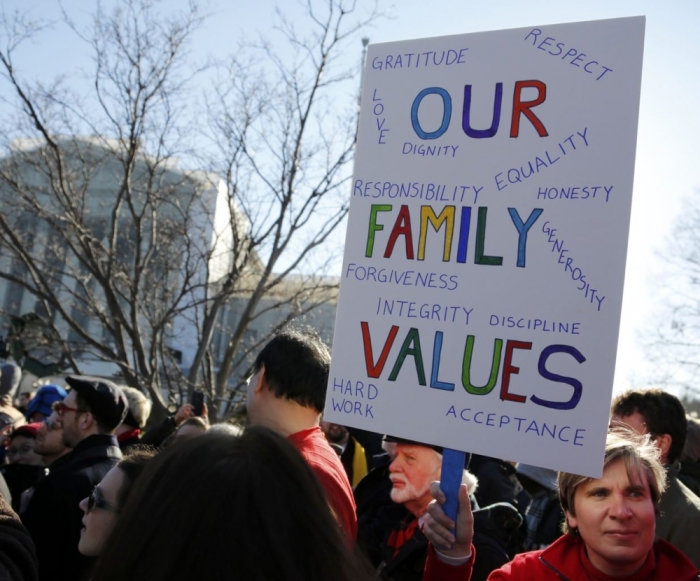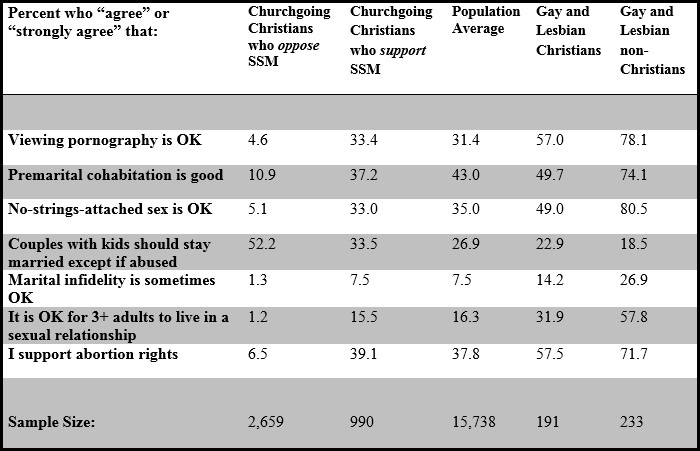Christians Who Support Same-Sex Marriage More Likely to Support Other Types of Sexual Immorality, Data Shows

New survey research shows that Christians who support same-sex marriage are more likely to hold permissive views on other sexual morality issues, such as divorce and pornography, similar to the general population and far different from Christians who support traditional marriage.
The "Relationships in America" survey, conducted by University of Texas sociologist Mark Regnerus, interviewed 15,738 Americans between the ages of 18 and 60. From that sample, Regnerus compared the average views on a range of sexual morality issues of churchgoing Christians who oppose same-sex marriage (2,659 in the sample) and churchgoing Christians who support same-sex marriage (990 in the sample).

Regnerus wrote about that comparison in an article for Public Discourse.
When asked if "viewing pornography is OK," only five percent of churchgoing Christians who oppose same-sex marriage answered that they "agree" or "strongly agree," compared to 33 percent of churchgoing Christians who support same-sex marriage. The national average is 31 percent.
All the other issues similarly showed that the views of churchgoing Christians who support same-sex marriage were similar to the general population while churchgoing Christians who oppose same-sex marriage looked different than the general population.

On the question of whether "premarital cohabition is good," the difference between opponents/supporters of same sex-marriage among churchgoers was 26 percentage points (11 percent and 37 percent, respectively).
Few churchgoing Christians who are opposed to same-sex marriage agreed that "it is OK for two people to get together for sex and not necessarily expect anything further" (five percent), "it is sometimes permissible for a married person to have sex with someone other than his/her spouse" (one percent), "it is sometimes permissible for a married person to have sex with someone other than his/her spouse" (one percent), and "it is OK for three or more consenting adults to live together in a sexual/romantic relationship" (one percent). Churchgoers who support same-sex marriage were much more likely to say those things were OK (37 percent, 33 percent, 8 percent and 16 percent, respectively).
When asked, "if a couple has children, they should stay married unless there is physical or emotional abuse" (emphasis in original), about half, 52 percent, of churchgoing Christians opposed to same-sex marriage agreed while only one-third of churchgoing Christians who support same-sex marriage agreed.
The data does not mean that Christians who support same-sex marriage will automatically shift their views on a range of sexual morality issues, clarified Regnerus, associate professor of sociology at The University of Texas at Austin. The explanation is more complicated.
"In reality, our moral systems concerning sex and sexuality tend rather to resemble personalized 'tool kits' reflecting distinctive visions of the purpose of sex and significant relationships (and their proper timing), the meaning of things like marriage and gender roles, and basic ideas about rights, goods, and privacy. Americans construct them in quite distinct combinations, often cafeteria-style," he wrote.
As support of redefining marriage to include same-sex couples has grown in recent years, the issue has divided denominations and congregations. Most of those battles have taken place in Mainline Protestant denominations while Evangelical denominational leaders have stood firm in their support for traditional marriage.
Mainline denominations, for instance, have debated whether homosexuality is a sin and whether to allow ordination of celibate homosexuals, ordination of non-celibate homosexuals, blessings of same-sex unions, and marriage rites for same-sex couples.
Some liberal Evangelicals have questioned whether their churches should stand against the changing cultural mores or shift, or deemphasize, their views to adapt to the times. Evangelical author Rachel Held Evans, for instance, has argued that Millennial Evangelicals want an end to the "culture wars" and are turned off by an "obsession with opposing gay marriage." And Matthew Vines, an Evangelical who is gay, wrote a book published this year arguing that scripture does not condemn homosexual behavior that is part of a committed relationship.
In a recent interview with The Christian Post, Russell Moore, president of the Southern Baptist Convention's Ethics and Religious Liberty Commission, countered by noting that historically the churches that remained the strongest were not those that decided to go along with the culture. Rather, churches that have rejected the orthodox teachings of Christianity have seen the most decline.
"History has demonstrated time and time and time again that you don't save Christianity by abandoning Christianity," he said.
In a Monday article for National Review, Andrew Walker, director of policy studies for the Ethics and Religious Liberty Commission, wrote about the data. He argued that churches that become more liberal on sexual mores tend to become more liberal on other aspects of Christianity as well to the point where their faith loses its distinctiveness.
"It may seem too simple to infer, but the conclusion begs to be written: Liberal sexual beliefs work, in the long run, to make fewer Christians," Walker wrote.




























